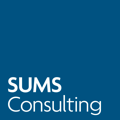
| Date | Author |
|---|---|
| 26th October 2020 | Joel Arber |
Last week, SUMS gave university marketing leaders a chance to get their heads up for air at its Marketing, Student Recruitment and Communications Community of Practice Group. It was a day of rich discussion focused on three key themes: the digital transformation of the student journey; leading change through crisis; and predictions for the future of higher education marketing. Here, Managing Consultant & Group Head of Business Development Joel Arber draws key insights from the day.
Want to Get Something Done? Ask a Busy Marketing Director
It is now more than seven months since Covid-19 brought campuses across the UK into lockdown, along with the rest of the country. Managing the pandemic and what has happened since as universities planned for, and then adapted to, the initial lockdown has meant an extraordinary year of pressure for university leaders. In particular, managing the new student recruitment cycle, and the reopening of campuses last month (directly seen as driving a second wave of infection) has put enormous pressure on university marketing functions.
University marketing teams have been in crisis communications mode since February – a trend which shows little sign of abating. The challenges of managing student expectations, keeping staff informed, and attempting to defuse external media bombs has given most university media practitioners more exposure to crisis comms in a single year than they have experienced in their careers to date. But add to that heady brew the chaos surrounding this year’s A-Level and BTEC results and its impact on clearing, adjustment and student enrolment – the dominant income stream for most universities – and it is little surprise that marketing directors have been the busiest leaders in universities during the pandemic.
Last week, SUMS gave university marketing leaders a chance to get their heads up for air at its Marketing, Student Recruitment and Communications Community of Practice Group. The event brought together leaders of marketing and external relations functions from across the sector, in the spirit of catharsis, to share their experiences of this unprecedented period. Together, we discussed the things that had worked really well, along with the lessons we’ve each learned over recent months.
It was a day of rich discussion focused on three key themes: the digital transformation of the student journey; leading change through crisis; and predictions for the future of higher education marketing. Our network of leaders set aside the plate-spinning for a few hours to talk shop.
You Say You Want a Revolution…
Marketing in the HE sector is still on a development curve. Many institutions appointed their first director of this key professional service function in the last decade, and it remains a rarity for a marketing or comms professional to have a seat at the vice-chancellor’s executive table. The trajectory of the curve has been steep but needs to get steeper still. Why? To meet twin demands: the strategic objective of universities to grow their income at a rate above that of their rapidly rising cost-bases – an economic necessity; and to meet the expectations of its customers (damn, I used the ‘c’ word). These symbiotic needs were already fueling a quiet revolution as universities invested in professionalising their marketing efforts. But Covid has upped the ante. It has driven digital transformation of teaching and learning in the sector and is now upping the volume on the marketing revolution.
Our friends at Microsoft and Adobe inspired the group with the art of the possible, using case study examples from across the world to show what ‘great’ looks like. And it looks like a deeper understanding of the customer, where genuinely personalised, intuitive pre-enrolment journeys are brought to life digitally. It mirrors the consumer experience that the digital natives of Generation Z are already used to in the rest of their lives – the kind of consideration and purchasing journeys they have when they buy goods and services from other sectors. The tech helps make the journeys smarter and more nuanced, adapting to prospects as their thinking develops.
This more sophisticated digital marketing technology is already benefiting many universities in Australia and the US and is starting to make an impact on UK HE. Our network of marketing directors agreed that automated personalisation would be a transformational step and enable them to focus efforts on content. This would ensure university stories resonate with their audience, that customers experience the journeys and impacts that are intended, and that the university’s positioning is differentiated. Digital innovation could drive a marketing revolution in UK HE – potentially a real silver lining to come out of the Covid crisis.
Leading through Lockdown
SUMS’ Community of Practice Groups give university professional services leaders a great platform to talk to their peers. Yes, much of this is about sharing good practice, but the sessions also offer leaders the opportunity to vent their spleen and share their challenges. A problem shared is a problem halved and our attendees often find that their colleagues in other universities are facing the same issues. The marketing network took this chance to reflect, under Chatham House Rules, on what it had been like to lead an essential cog in the HE machinery through unchartered territory over the previous six months. Directors shared their personal experiences with a focus on what had been their ‘lockdown lifeline’ – something that had worked well for them and they would be keen to keep once we transition into a post-pandemic world.
Much of the focus of discussion was on how best to make progress – particularly with major change projects – during this difficult period. Many of the solutions feel familiar, but have been brought into sharper relief by the working from home restrictions.
Examples include:
- The importance of avoiding marketing jargon, which sits uncomfortably with many colleagues in HE
- The necessity of using robust data in making a case for change to academic staff
- Taking a pragmatic approach, recognising what it takes to make progress in a complex, collegiate decision-making setting.
- Being honest about what is actually achievable within the current resource footprint; to negotiate based on the impact that you are able to make, recognising the importance of small, high-impact changes at the beginning of a transformation programme
- Recognising the value of having a ‘critical friends’ group to challenge your thinking and approach.
Marketing leaders fully appreciated that soft power and influence are essential tools in the bag when it comes to getting things done. And as comms professionals, that should feel like comfortable territory.
However, colleagues also reflected on the loneliness of leadership as being something exacerbated by the pandemic. We all deploy our own coping mechanisms, but top of the recommendations list was making sure we get time away from our computer screens. ‘Working from home’ can all too easily seem like all-consuming 24/7 access, and taking some meetings by phone so that you can walk and talk rather than be tied to the desk has provided much-needed thinking (and physical) space.
The Tide is Turning, Ready-Up for the Rush
Our network of marketing leaders also indulged in some crystal ball gazing, predicting what the future might hold for HE marketing in a post-pandemic world. Student recruitment was the main item for discussion, with the demographic trajectory pointing to an additional 50,000 UK students a year by 2030. Similarly, a major study by HolonIQ points to an increase from 5 million to 7 million international students globally in the same timeframe.
Far from this leading to a feeling of complacency – if we weather the storm everything will be okay – our network of leaders saw this as an opportunity to drive change now in order to take full benefit of a future upturn. Now is a time to drive greater efficiency. To embrace the digital revolution. To shake up outmoded approaches. It’s a time to make sure processes, systems and people are up to the challenge – are ready to meet the demands of Generation Z and then Generation Alpha – digital natives who expect engagement on their terms, in their time.
The good times will come again – but only those pragmatic enough to change the way they do things will be able to take full advantage.
Reflecting on a great day of discussion, our network of university marketing directors did much to show what the future could look like for UK HE. The energy, passion and innovation allied to a flexible approach to doing business in the labyrinthine world of the academy makes our marketing leaders a powerful force for change. Professional expertise and excellent soft skills make for the kind of combination that would benefit university executive teams rather than just the marketing office. And for UK HE to truly compete in what is an increasingly global market, the argument for representation at the top table becomes less of a luxury, more of a necessity. After all, these are busy people who know how to get stuff done.
Joel Arber
Managing Consultant and Group Head of Business Development, SUMS
Joel joined SUMS Consulting, the not-for-profit charity owned by universities, as its Managing Consultant and Group Head of Business Development in 2019. He is also the professional lead at SUMS for branding, marketing and student recruitment assignments.
A graduate of the University of Edinburgh, Joel spent the early years of his career working in marketing roles and at advertising agencies across a wide range of clients, including Marks and Spencer, Rolls-Royce and the Royal Bank of Scotland. His transition into the higher education sector followed two years working with the Open University’s marketing agency as their Client Services Director and an adviser on brand and direct marketing. Joel became the University of Central Lancashire’s first Director of Marketing and Communications in 2010. A passionate strategic marketer, communications expert and senior leader he was promoted to Pro-Vice-Chancellor (External Relations) with responsibility for external engagement and policy-shaping.








